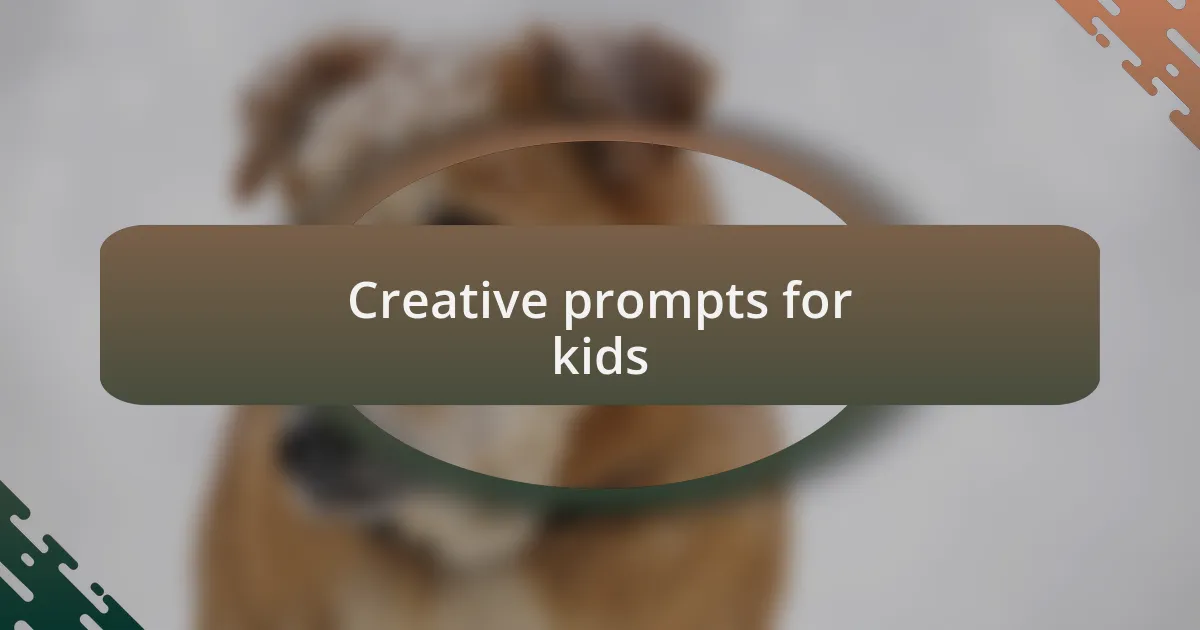Key takeaways:
- Writer’s block in kids often stems from perfectionism and fear of judgment, and it can be addressed through encouragement and validation.
- Storytelling is essential for children’s development as it fosters creativity, empathy, and language skills, providing opportunities for connection and exploration.
- Using creative prompts and encouraging open dialogues can inspire young writers, helping them to express their ideas without fear of judgment.
- Building a trusting environment where children can share their work enhances confidence and collaboration, motivating them to explore their unique narratives.
Understanding writer’s block in kids
Writer’s block in kids can manifest in several ways, such as frustration or reluctance to express thoughts on paper. I remember a time when my youngest sat at the table, pencil in hand, staring at a blank page with tears welling in her eyes. It struck me how deeply the pressure to create could affect her; I wondered, why should something as joyful as storytelling become a source of anxiety?
Many children face a mental barrier that prevents them from writing, often fueled by perfectionism or fear of judgment. I once spoke to a young boy who was so worried about making mistakes that he couldn’t even start his story. It’s important to recognize that these feelings are natural and can be addressed with gentle encouragement and validation.
Understanding this block means acknowledging the emotional weight behind it. Have you ever felt stuck, unable to articulate your thoughts? I certainly have. Children need to know that it’s okay to stumble and that their ideas, no matter how simple, hold value. This understanding can help them push through the mental fog and rediscover the joy of storytelling.

Importance of storytelling for kids
Storytelling plays a crucial role in a child’s development, acting as a gateway to creativity and emotional expression. I still remember the delight in my niece’s eyes when she shared a story about a magical forest. It wasn’t just about the narrative; it was a moment of connection where her imagination came alive.
Moreover, storytelling helps kids develop empathy by allowing them to step into another person’s shoes. Have you ever noticed how a simple story can evoke deep feelings? I observed my children discussing their favorite characters and how they would feel in various situations. This kind of engagement fosters an understanding of different perspectives, crucial for building social skills.
Additionally, storytelling enhances vocabulary and comprehension skills. I often find my son picking up new words from tales we read together, eager to use them in his own narratives. Seeing that spark of curiosity reminds me just how powerful stories can be in shaping a child’s learning journey. Each tale offers a new world to explore, igniting a lifelong love for reading and writing.

Techniques to inspire young writers
Encouraging young writers can be as simple as providing them with prompts that spark their imagination. I remember giving my daughter a picture of a dragon, and instead of just describing the dragon, I asked her how she thought it felt living in a cave. The moment her mind began weaving narratives around that feeling was magical; it was like watching her creativity take flight.
Another technique involves turning everyday experiences into stories. I once took a walk with my son and encouraged him to narrate everything we saw, from the buzzing bees to the rustling leaves. It transformed a mundane stroll into an adventure, illustrating how inspiration can bloom in the most unexpected places. Have you noticed how often kids see the world differently?
Finally, creating a storytelling group with peers can fuel excitement and spark new ideas. I facilitated a small gathering where children could share their stories aloud. The energy was electric as they reacted to each other’s tales, each one inspiring the next. Did you see how opinions and laughter flowed freely? It reminded me that collaboration can open doors to new imaginative realms, helping them see writing as a shared journey rather than a solitary task.

Creative prompts for kids
One of my favorite creative prompts for kids involves using their favorite toy as a storytelling muse. I once encouraged my daughter to imagine her stuffed bear as the captain of a spaceship. What adventures do you think a bear would have among the stars? Watching her excitement as she described intergalactic missions and alien encounters not only made her giggle but also let her explore her own courage and friendship themes.
Another effective prompt is to invite kids to create alternative endings for their favorite stories. I challenged my son to rewrite the conclusion of a well-known fairytale, imagining a scenario where the princess saved the day instead of the knight. This sparked a passionate discussion about bravery, empowerment, and how stories can evolve based on perspective. Have you ever wondered how a simple shift in a storyline can unlock deeper meanings?
Sometimes, drawing a picture can serve as a fantastic starting point for a story. During art hour, I handed my kids a blank canvas and asked them to paint a scene from their imagination. I was amazed at how quickly they turned their artwork into vibrant tales. How does one picture lead to an entire adventure filled with characters and emotions? Those moments remind me that creativity knows no bounds, and the only limits are the ones we set ourselves.

Overcoming fears of expressing ideas
When it comes to expressing ideas, I often find that fear stems from the worry of judgment. I remember my first storytelling workshop—it felt overwhelming to share my narrative with others. But once I saw their encouraging smiles, it dawned on me that everyone was equally nervous. Isn’t it fascinating how we all share similar insecurities?
I’ve discovered that writing freely, without editing at first, can be liberating. Once, I challenged myself to write a short story in just 10 minutes, pouring out every idea that came to my mind. The result wasn’t polished, but it was authentic. How often do we miss out on pure creativity just because we’re too focused on perfection?
Sometimes, it helps to remember that our ideas are unique gifts. I’ve seen countless kids shy away from sharing their thoughts, thinking they don’t matter. Yet, every story can resonate with someone out there. Have you experienced the joy of hearing a child’s laughter after sharing their tale? It’s a beautiful reminder that what we express can impact others in unexpected ways.

Encouraging open dialogues about writing
Encouraging open dialogue about writing starts with creating an atmosphere of trust. I remember a session where kids were paired in twos to share their rough drafts. The excitement in their voices as they exchanged ideas was palpable. Isn’t it amazing how sharing can turn solitary fears into collaborative joy?
When I facilitated discussions on storytelling, I noticed how much confidence grew when everyone voiced their thoughts. One child, who usually held back, surprised us all with a unique twist in their narrative after hearing feedback. Have you ever felt that spark of inspiration when others recognize the value of your ideas? It shows that dialogue isn’t just about sharing—it’s about building each other up.
Open conversations about writing also help to dismantle the notion of “right” or “wrong.” I recall a moment when a young storyteller worried about their plot choice. The room responded not with criticism, but with curiosity, asking questions that made them rethink their direction. Isn’t it powerful how questions can guide us to greater clarity? This kind of dialogue nurtures creativity and allows every voice to flourish.